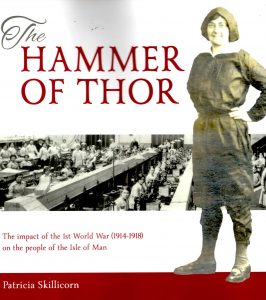Despite its title, this book has little to do with Norse mythology, but one of its meanings, ‘fearful destruction’, is a perfect epitaph of the life-changing consequences of what was termed the Great War.
The effect of war is, by its very nature, manifold, but in her new book Patricia Skillicorn reveals the true picture of how the Island fared during World War I and what became of it at the cessation of conflict; including some valuable first-hand accounts. Our unique position juggled the provision of internment alongside providing a higher proportion of men for military service than anywhere else in the British Isles, self-sufficiency became a priority, the visiting industry, along with its valuable income, vanished virtually overnight and the aspiration of Home Rule fell by the wayside.
This is a compelling story which also provides important detail about the Island prior to World War I, setting the scene for what arrived in its wake as the Lieutenant Governor, Lord Raglan, members of the House of Keys and a number of important social reformers, such as Samuel Norris, labour radicals and unionists, faced the challenges of a declining local population and inevitable economic problems; but not always singing from the same hymn sheet.
Well researched and informative, The Hammer of Thor provides a sometimes brutal account of how islanders survived away from the battlefield, (particularly women) deficient of a number of social monetary benefits available in England.
But in amongst the sacrifice, depravation and despair of the working class, Patricia also presents the reader with details of how resourceful Manx people were at this time, developing strategies, coping mechanisms and embracing the need for enterprise.
The Hammer of Thor can also describe a protection of mankind, but other sources, appropriately, reveal it to be an indicator of a future path.
Available from Island bookshops priced £15.
Valerie Caine
© March 2017
(Courtesy of Manx Tails)

